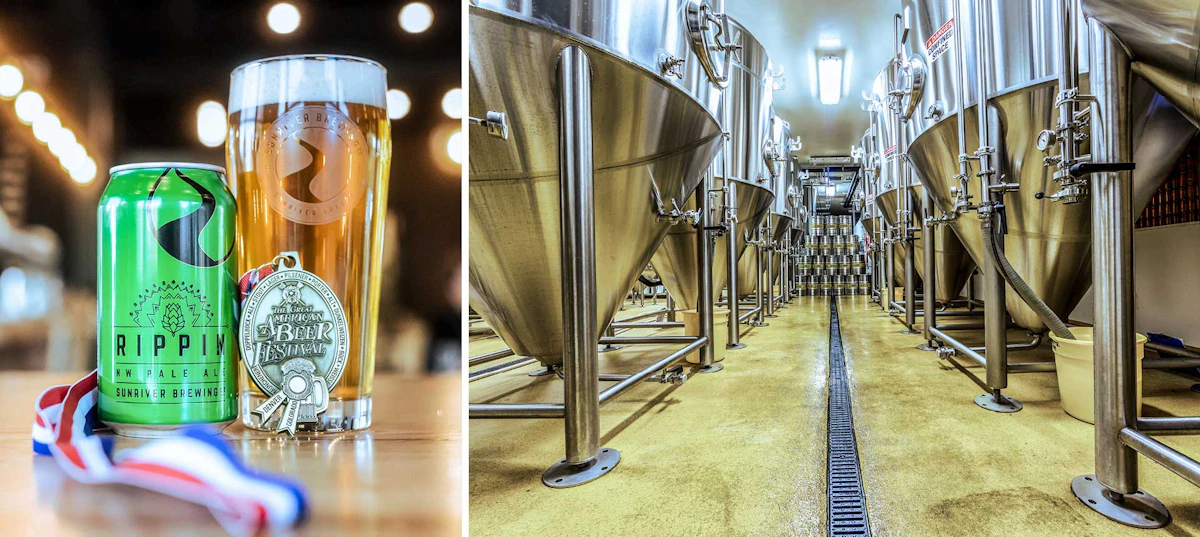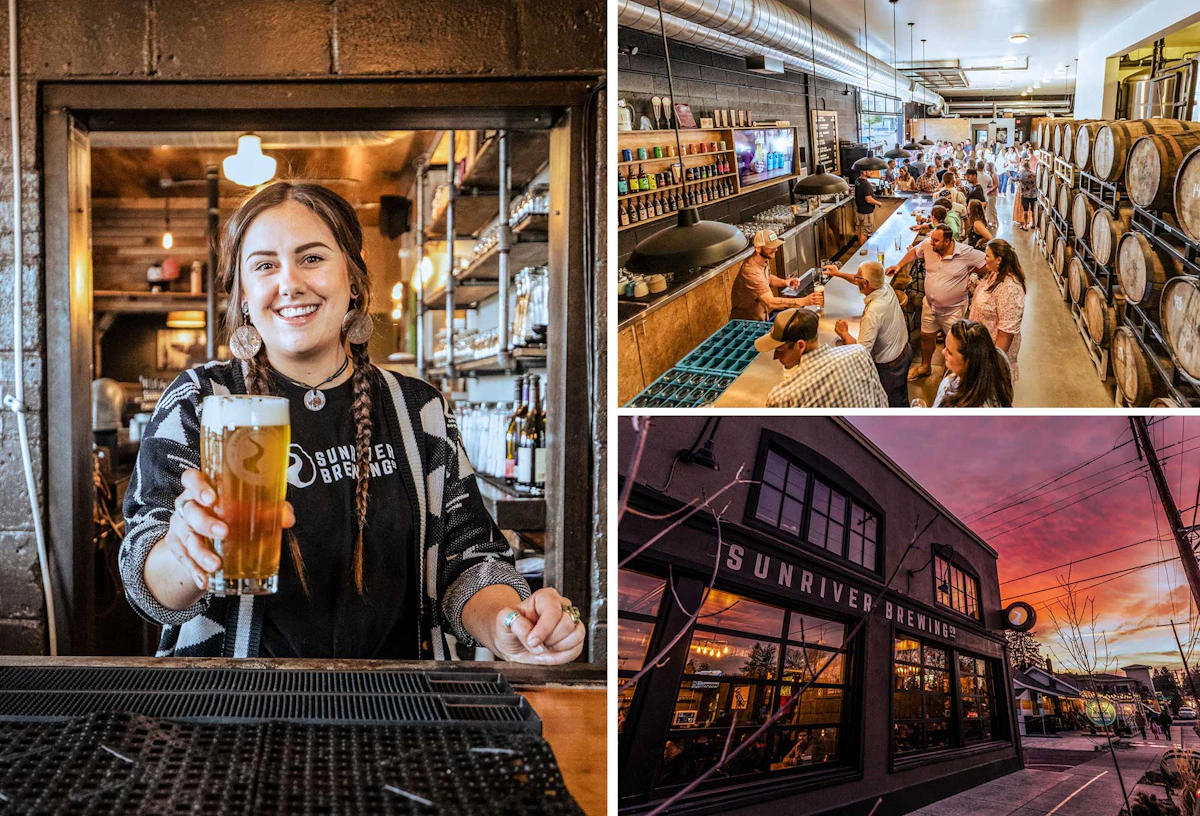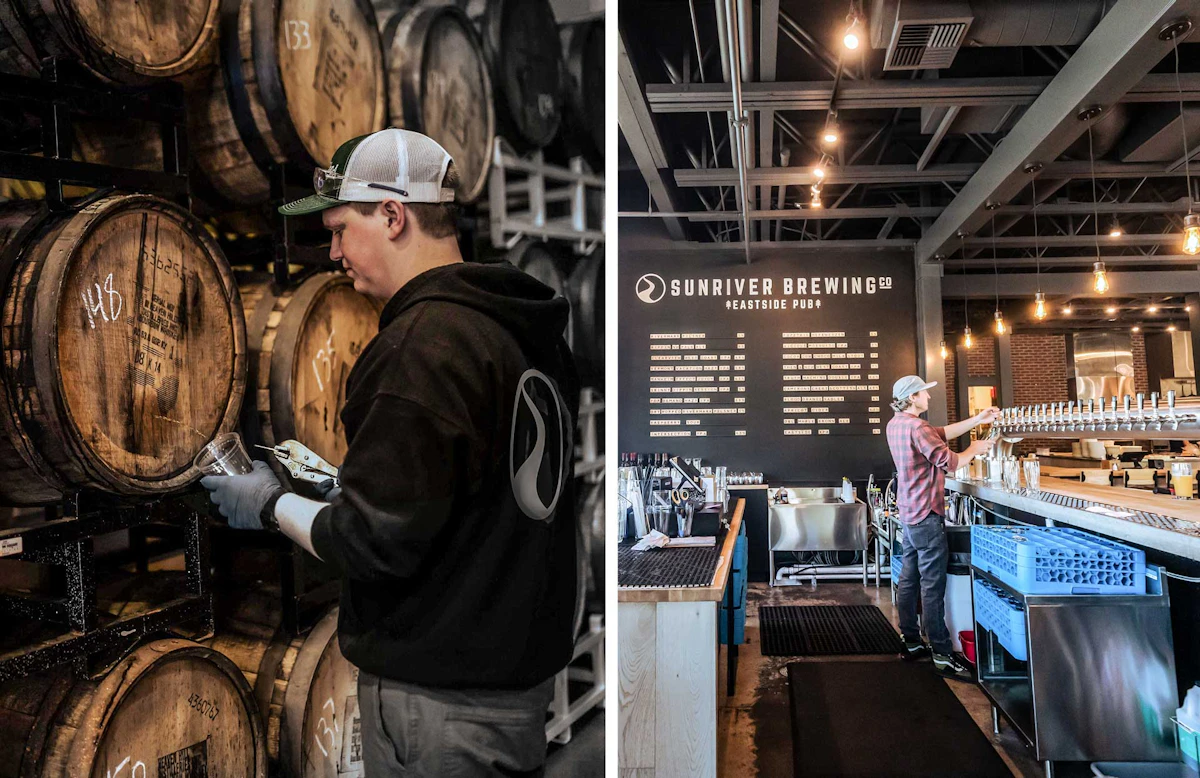Head brewer Patrick Raasch humbly describes Sunriver as a “brewery down in the woods.”
Headquartered a 25-minute drive from Bend, Oregon, in the picturesque tourist destination of Sunriver, it feels—even to Oregonians—culturally removed from the state’s brewing locus in Portland. No matter: Sunriver has put itself on the national map with enough major awards to necessitate their own page on the brewery’s website.
Last year was a banner one for Sunriver, with medal after medal culminating in the title of Great American Beer Festival Brewery of the Year for its size (5,001–15,000 barrels), plus Large Brewing Company of the Year at the Oregon Brewing Awards. While the onslaught of accolades appeared to come all at once, it’s the result of years of smart operational choices and, sometimes, hard decisions.
Unifying nearly 200 employees of a production brewery, a taproom, and four satellite pubs around a culture of quality takes time, structure, and resources. Sunriver opened as a restaurant in 2012, outsourcing beer production until it added its own brewhouse in 2014. Shortly afterward, its leadership faced what founding brewer and director of brewing operations Brett Thomas calls an identity crisis.
“We were really unsure if we were a brewing company that had multiple restaurants, or a restaurant company that had a great brewery,” he says. A chance to rewrite the company’s charter provided the needed clarity. “The first words to it are, ‘We are a craft brewery.’ So that allowed us to start organizing our thoughts and make decisions about how we align our business.”
Compared to other operational imperatives, Thomas says, great beer is relatively easy for Sunriver to achieve. Some of the biggest improvements of the past few years haven’t come from the brewhouse, but from operational changes. These include streamlining the brewery’s upper leadership structure, empowering Warren Cruze—one of the pub general managers—with the title of “staff educator,” and unifying the oversight of production, packaging, and sales teams.
Those incremental adjustments to managing the quality of food, packaging, and hospitality are just as important to Sunriver’s longevity as beer medals—if not more so.
“Good beer, even great beer, is not enough to win the battle,” Thomas says. “You’ve got to have the whole picture.”

Centralizing Production, but Decentralizing Sales
Every drop of the roughly 13,000 annual barrels that Sunriver has brewed for the past four years comes off a single 15-barrel brewhouse. That ensures centralized quality standards, but it also requires three to four brews per day, year-round.
Sunriver sells just 17 percent of its production through its pubs, with the remaining 83 percent going through seven wholesalers. Almost all the brewery’s volume is sold in Oregon, but it also sends limited amounts of beer to parts of Washington, Idaho, and northern California.
This model creates organizational complexity, which the company tries to minimize where it can. For example, there used to be wider variation between the types of beers brewed for distribution and those brewed for Sunriver’s pubs. Today, that’s rarely the case. Sunriver still produces the occasional one-off, pub-exclusive beer, but it sells the vast majority of its beer both via distribution and across the pubs and taproom.
“Very seldom anymore are we brewing something that we cannot sell through both sides of the business, which has created a bit of a safety net,” Thomas says. “The main focus is on beers we can allocate to our seven wholesalers and then allocate the remainder to our pubs and taproom.”
The nimble brewhouse combined with five on-premise outlets means brewers can explore a style they think might have legs (are amber ales back?) with a bit of that “safety net.” Each of Sunriver’s pubs has its own identity—the Oakway pub in Eugene, Oregon, is located beneath a hotel and gets busy during Oregon games, while the Eastside Bend pub caters to a neighborhood crowd.
So, in Bend, for example, drinker interest in hazy IPAs might be declining, but those are still strong sellers in more rural areas where Sunriver distributes. Head brewer Raasch keeps an eye on newer styles that are becoming popular in states such as California—but ultimately, the more important question is whether drinkers in Sunriver’s pubs and distribution territory are interested.
“A great example of that: Boise was definitely not ready for West Coast pilsner,” Thomas says. (Idahoans may just be temperamentally allergic to anything associated with the West Coast.)
One of Sunriver’s best tools for right-sizing production is also one that causes inefficiency: its small brewhouse. Raasch can brew 15 barrels or 45 barrels of a given style, and he’s designed the cellar to quickly throttle up or down when it comes to changes in production planning.

Like a Good Neighbor
The brewery’s mounting success is proof that dogged operational planning can lead to tangible wins—sometimes literal wins in the form of competition medals.
The challenge facing Sunriver is how to convey that momentum to a general audience who doesn’t care what a World Beer Cup gold medal means. The goal is for guests to recognize Sunriver as excellent not because of external awards, but because of the experience they have with its beer or at its pubs.
Luckily, Thomas says, the company is aligned on that value. “Leadership has more faith in myself and Patrick than at any time in the history of the company,” he says, “and we’re generally well resourced and have a pretty wide lane to travel in.”
Brewery leadership would be pleased with the feedback from Mike Bolt, who co-owns Final Draft Taphouse in Vancouver, Washington, with his wife, Kimberly Johnson. Bolt says Sunriver is in a rare stratum of breweries whose one-off beers he’ll buy from his distributor without a second thought. While the Bolts already respected the quality of Sunriver’s beers, they also found it matched by the on-site experience when they visited the taproom on a vacation last August.
“The reason we went to Sunriver, Oregon, was because of Sunriver Brewing,” Bolt says. “We ended up at the taproom every afternoon on our trip because the service was amazing. The bartenders were great. I’ve been in the industry for a long time, and that goes a long way.”
Another Oregon beer retailer echoes that sense of appreciation for—and from—Sunriver. Ami Shannon and her husband, Brian, co-own and operate Valley Public House in Portland. She says Sunriver puts in extra effort to let her and her customers know they’re valued. The Sunriver team not only brews an anniversary beer for Valley Public House, but they also invite the Shannons out to help with the brew day; brewery staff also regularly visit the bar and interact with drinkers. “Just the fact that they come out and meet our customers and do things that make it an experience for our customers, that matters,” Shannon says. “Some brewers, we’ll be a top account of theirs, and they don’t even know that we sell their beer. We like it when someone recognizes the hard work we do to get their beer out there.”
Great American Beer Festival medals came up only occasionally in retailers’ comments about Sunriver, and they mostly validated the brewery’s existing reputation. (Awards don’t help sales, Thomas says, but they certainly don’t hurt.) Instead, retailers care about the nuts and bolts: consistent quality across styles, a varied portfolio, and good communication and outreach from the supplier.

Going All-In
The respect Sunriver has earned from retail partners and other breweries starts with the quality of its beer, but that’s only the foundation.
When staff from Fort George Brewery and Public House in Astoria, Oregon, collaborated with Sunriver on a West Coast extra pale ale in August 2024, they weren’t only impressed with the brewery’s knowledge of lot-specific hops. They also admired Sunriver’s commitment to employee training and support, as well as their investment in the full pub experience beyond the beer component.
“There’s a lot to be said about the business and the way they treat their employees,” says Brian Bovenizer, director of marketing at Fort George. “A lot of their crew has been [working there] for a long time. Like us, they have an overall desire to do things the best you can and try to get everyone to buy in. We want to be as welcoming to families as we are to beer nerds [and] people just dipping their toes into beer, and I feel like Sunriver does that really well.”
Thomas says he’s made it a priority over the years to increase employee wages and benefits to help Sunriver compete for talent with larger neighbors such as Deschutes and 10 Barrel. As a result, he says, staff retention has improved, with noticeable effects on both beer quality and the level of pub hospitality.
Bovenizer says that Fort George found the mind-meld so successful last summer that they’ve invited Sunriver back as one-third of their Three Way IPA collaboration for 2025. The invitation to this annual collab is prestigious—Fort George chooses the two visiting breweries “for their mastery in the art of IPAs,” and they’ve previously included the likes of Cellarmaker, Georgetown, Level Beer, Alvarado Street, and more.
“What we really seek in a collaborator is someone who’s going to be all-in,” Bovenizer says. “Sunriver brought out their whole team, and they pretty much shut down their brewery to come out here. They were so open with their knowledge of hops, and that was surprising.”
Sunriver is best known—and highly awarded—for its IPAs, but the brewery isn’t staking its entire business on those. After Vicious Mosquito IPA, it’s a hefeweizen called Fuzztail that sells the greatest volume for Sunriver, mostly on draft. Behind Fuzztail are a cluster of rotating lagers and various permutations of IPA, both hazy and West Coast.
The brewery also has a well-regarded wild and barrel-aged program, with one-offs such as an Italian-style pilsner and an amber lager. Thomas says it’s important for diverse drinkers with their own palates to be able to find an entire flight of five beers that they love in the pubs—or to feel confident spending $16 on a Sunriver four-pack they haven’t yet tried.
Competition medals confirm the brewery is on the right track, but Raasch and Thomas aren’t resting on their laurels.
“We certainly seek perfection,” Thomas says. “We don’t always get there, but it’s in our DNA just to keep chasing it.”
